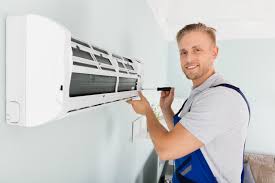If you’re facing a heating and cooling emergency repair in Indianapolis, IN, knowing the potential causes and solutions can help you stay calm and take appropriate action. From unresponsive thermostats to unexpected spikes in your utility bills, this guide covers the most common HVAC emergencies Indianapolis homeowners might encounter. Let’s dive into the key issues and explore how you can troubleshoot or prevent them.
Unresponsive Thermostat: Troubleshooting Thermostat Issues
One of the most common HVAC problems is an unresponsive thermostat. If your home’s temperature isn’t changing despite adjustments to the thermostat, don’t panic—there are several steps you can take to troubleshoot the issue.
- Check the Power Source: Sometimes, the thermostat may simply be powered off. Make sure the unit is turned on and check if the batteries need replacement. If your thermostat is hardwired, ensure there’s no tripped breaker or blown fuse.
- Verify the Settings: Double-check that your thermostat is set to the correct mode—heating or cooling—and that the temperature settings are where they should be. It’s easy to accidentally set the temperature too low or high, especially if you’re using a programmable thermostat.
- Inspect the Wiring: If you’re comfortable doing so, remove the thermostat cover and look at the wiring. Loose or corroded wires could be the culprit. However, if you’re unsure or uncomfortable, it’s best to call in a professional.
- Reset the System: Sometimes, a simple reset can fix the problem. Refer to your thermostat’s manual for instructions on how to reset it. If the issue persists, you may need professional assistance to determine if the thermostat needs replacement or if there’s a more significant issue with your HVAC system.
If these steps don’t resolve the problem, it’s likely time to call in a professional to assess whether your thermostat needs replacing or if a more significant issue is at play.
Strange Noises from Unit: Identifying Unusual Sounds
Hearing strange noises coming from your HVAC unit can be unsettling, but these sounds often provide clues about what’s wrong with your system. Recognizing these noises and understanding their implications can help you address the problem before it escalates.
- Banging or Clanking: This could indicate a loose or broken part inside the unit, such as a fan blade or motor component. Banging noises often require immediate attention to prevent further damage.
- Hissing: A hissing sound might mean there’s a refrigerant leak, which is a serious issue. Refrigerant leaks can not only cause your system to lose its cooling ability but can also be harmful to your health. This problem requires prompt professional repair.
- Squealing: A squealing sound usually suggests a problem with the motor bearings or a slipping belt. While not an emergency, it’s wise to get this checked out before it leads to a system breakdown.
- Clicking: Frequent clicking when your unit starts up or shuts down might indicate a relay problem or an issue with the electrical components. If the clicking is constant, it could mean a faulty thermostat or control board.
Identifying these noises early and understanding their causes can help you take swift action, potentially saving you from more costly repairs in the future.
Inconsistent Temperature Levels: Diagnosing Temperature Discrepancies
If some rooms in your home are too hot while others are too cold, it can be frustrating and uncomfortable. Inconsistent temperature levels are a common HVAC issue, but they can often be resolved with a few adjustments or repairs.
- Blocked Vents and Filters: Often, inconsistent temperatures are due to airflow issues caused by blocked vents or dirty air filters. Check and replace your air filters regularly, and make sure vents are open and unobstructed by furniture or curtains.
- Thermostat Placement: The location of your thermostat can impact its ability to regulate temperature accurately. If your thermostat is placed near a heat source like a sunny window or an appliance, it could cause the system to overcool or overheat. Consider relocating the thermostat to a central, shaded area for better temperature control.
- Ductwork Issues: Leaky or poorly insulated ducts can lead to uneven heating or cooling throughout your home. If some rooms are significantly warmer or cooler than others, it might be worth having your ductwork inspected and sealed by a professional.
- Aging System: If your HVAC system is older, it might struggle to maintain consistent temperatures due to wear and tear. Upgrading to a newer, more efficient model can solve this problem and reduce energy costs.
Ensuring even temperatures in your home not only enhances comfort but also improves energy efficiency, which brings us to our next point—frequent system cycling.
Frequent Cycling On/Off: Addressing Constant System Cycling
When your HVAC system cycles on and off frequently, it’s not only annoying but also a sign that something may be wrong. Frequent cycling can shorten your system’s lifespan and drive up energy costs. Here are a few potential causes:
- Oversized System: If your system is too large for your home, it will heat or cool the space too quickly, leading to short cycling. This not only wastes energy but also fails to adequately dehumidify the air, leaving your home feeling clammy. An HVAC professional can assess whether your system is appropriately sized for your home.
- Thermostat Issues: A malfunctioning thermostat can also cause your system to cycle on and off too frequently. Ensure the thermostat is calibrated correctly and placed in a location where it can accurately read the ambient temperature.
- Low Refrigerant: If your system is low on refrigerant, it can cause the unit to overheat and shut off prematurely. This issue requires professional attention to check for leaks and recharge the refrigerant.
- Clogged Air Filters: Dirty air filters restrict airflow, causing the system to work harder and cycle more frequently. Regularly replacing your filters can prevent this issue and improve overall system efficiency.
Addressing the cause of frequent cycling promptly can prevent further damage to your HVAC system and help maintain energy efficiency in your home.
High Utility Bills: Understanding Cost Impacts
Nobody likes opening a utility bill that’s higher than expected. If your energy costs are rising without a clear reason, your HVAC system could be to blame. Here are a few potential issues to consider:
- Inefficient System Operation: Older systems or those with failing components will work harder to maintain comfort levels, consuming more energy. Regular maintenance and timely repairs can keep your system running efficiently.
- Thermostat Settings: Keeping your thermostat at extreme temperatures can cause your system to run continuously, driving up energy costs. Consider using a programmable thermostat to optimize energy usage by adjusting temperatures when you’re not home.
- Poor Insulation: Inadequate insulation in your home can cause heated or cooled air to escape, making your HVAC system work harder to compensate. Ensuring your home is well-insulated can reduce strain on your system and lower your utility bills.
- Air Leaks: Leaks around windows, doors, and ductwork can let conditioned air escape, leading to higher energy usage. Sealing these leaks can improve your system’s efficiency and help keep your energy bills in check.
Taking these factors into account can help you pinpoint the cause of high energy bills and take steps to reduce them, ensuring your HVAC system operates efficiently.
Final Thoughts
Heating and cooling emergencies can be a major source of stress, but being informed about common issues can make a big difference. By understanding the signs of trouble—whether it’s an unresponsive thermostat, strange noises, or inconsistent temperatures—you’ll be better equipped to take action before the problem escalates. Regular maintenance, prompt repairs, and professional assistance when needed can keep your HVAC system in peak condition, ensuring your home remains comfortable all year round. Don’t hesitate to reach out to a local expert when you encounter any of these issues—they’re here to help you stay ahead of any potential problems.




